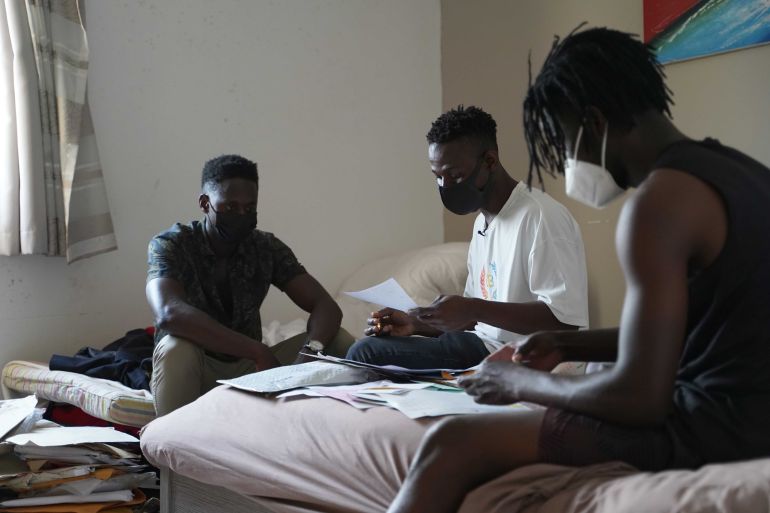Freedom for the ElHiblu3!
The criminalisation of asylum seekers in Europe should concern all of us.

Three young African men face terrorism charges before a Maltese court. In March 2019, they were among a group of 108 asylum seekers who were rescued from a rubber boat adrift in the Mediterranean Sea by the tanker ElHiblu1.
Although the crew of the tanker promised the rescued that they would be brought to safety in Europe, the ElHiblu1 steered south. The captain followed the instructions of a patrol aircraft of the European Union operation Eunavfor Med to proceed to Tripoli in Libya. When realising that they were being illegally returned to Libya, the rescued protested, pleading with the captain not to force them back to the place of torment they had just escaped.
Three of the rescued, all of them teenagers at the time, mediated between the asylum seekers and the crew members. Eventually, the captain gave in and redirected the tanker north, to Malta. As one of the defendants later wrote in a letter to the public: “In defence of our lives, we resisted by protesting and I, along with two others, served as translators because we had some basic knowledge in English. We did not do this with any bad intentions and we have no plans to pose threats or danger to the people of Malta.”
Upon arrival in the harbour of Valletta, the three teenagers – the “ElHiblu3” – were arrested, accused of various crimes, including acts of terrorism. Today, more than two-and-a-half years later, the trial of the three has still not ended. If convicted, they could face life in prison.
We are part of a newly established initiative: the “ElHiblu3 Freedom Commission”. Together with ship captains, religious leaders, legal experts, public intellectuals, and humanitarian organisations, we denounce the deep injustice experienced by the three accused and call for the immediate dismissal of the trial.
Their case is symptomatic of worrisome developments throughout Europe. Asylum seekers steering precarious dinghies and landing on Greek islands or in Italy are sentenced to years, sometimes decades, in prison. Captains of humanitarian ships conducting mass rescues in the Mediterranean are threatened with prosecution and are routinely blocked from leaving European harbours.
In the United Kingdom, drivers of boats across the English Channel face criminalisation and ever-smaller chances of gaining asylum. Even mayors who act in solidarity with migrants and refugees face serious time behind bars.
All the while, anti-migrant violence and “push-back” operations are becoming increasingly normalised at Europe’s external borders, despite the fact that they breach international law and the principle of non-refoulement. In the Aegean Sea, engines of boats carrying asylum seekers are disabled by the Greek coastguard and their passengers threatened and abandoned at sea. In the Central Mediterranean Sea, tens of thousands trying to flee are forced back to Libya through collective Libyan-European border enforcement.
Along the Atlantic route to the Canaries, NGOs have documented more than 2,000 maritime deaths of asylum seekers, only this year. At the borders of Croatia, Poland, or Lithuania, we see images of migrant bodies bearing marks of violent beatings. And in the English Channel, the UK Border Force already trains for push-back operations and collective expulsions.
The case of the ElHiblu3 embodies these systematic attempts in Europe to violently deter asylum seekers from reaching EU territory and to criminalise those who do arrive. We cannot stand by and watch as the rule of law is undermined further in Europe and at its external borders. The obscene criminalisation of those in greatest need of protection concerns all of us: we need freedom commissions for every individual unjustly tried in Europe.
For us, freedom commissions are tools to open up wider spaces of political action and to push for a radical transformation of the ways in which migration and borders are governed in Europe. This means, at the same time, to challenge and transform Europe’s position in the world in the current conjuncture, while eventually struggling for a new politics of citizenship and social rights within Europe.
We regard the “ElHiblu3” as courageous individuals who should be celebrated for preventing an illegal pushback to Libya. Due to their actions, 108 individuals were not returned to a place where they would face torture and rape in inhumane detention centres.
For those who have no other option but to embark on a dangerous sea journey, the boat is a desperate means of seeking freedom and safety. Over the past years, tens of thousands of individuals have lost their lives during attempted escapes, while hundreds of thousands have survived. Both the ongoing dying and the prosecution of survivors of sea crossings demand civil society to act and to resist, in transnational and collective ways.
The views expressed in this article are the author’s own and do not necessarily reflect Al Jazeera’s editorial stance.